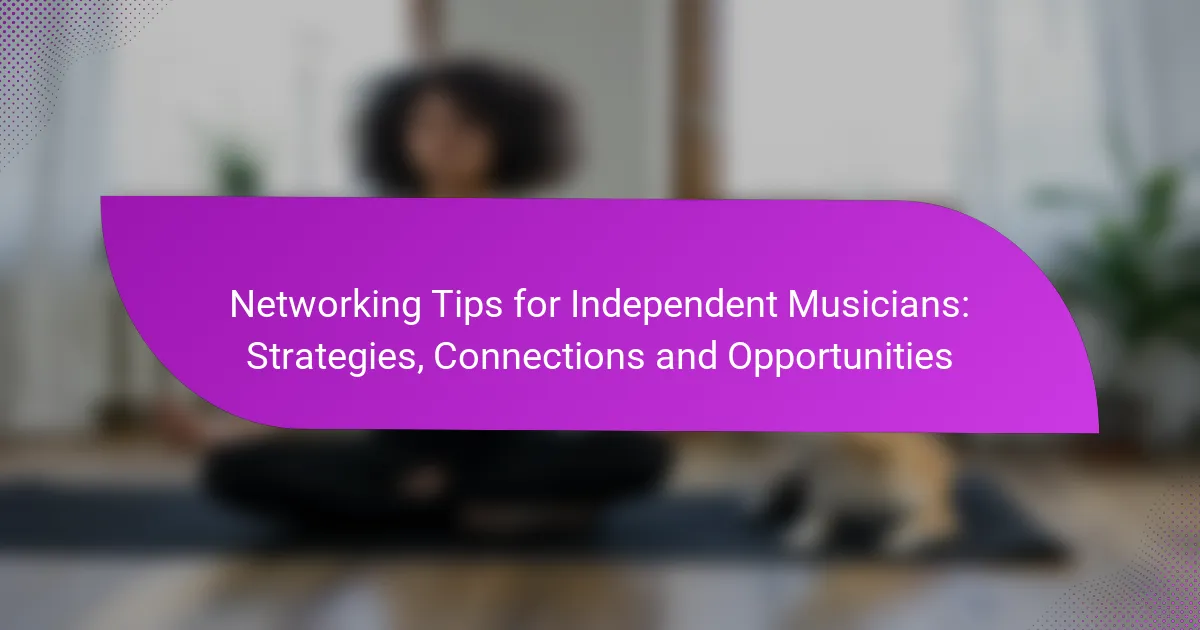Networking is essential for independent musicians seeking to advance their careers and create meaningful connections within the music industry. By utilizing social media and online platforms, artists can enhance their visibility, build their brand, and foster collaborations that lead to new opportunities. Engaging with peers and audiences through targeted content and strategic interactions can significantly impact their professional growth.
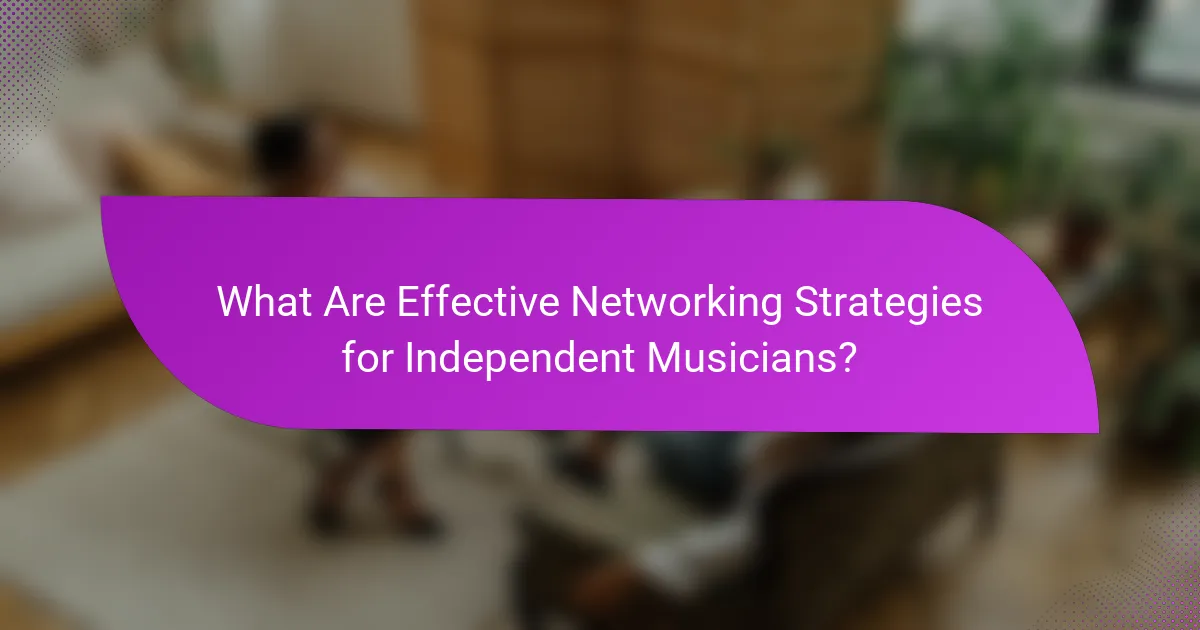
What Are Effective Networking Strategies for Independent Musicians?
Effective networking strategies for independent musicians involve building relationships, enhancing visibility, and creating opportunities within the music industry. By leveraging online tools and engaging with peers, musicians can expand their reach and foster collaborations that enhance their careers.
Building a strong online presence
Establishing a strong online presence is crucial for independent musicians. This includes having a professional website that showcases your music, biography, and contact information. Use platforms like Bandcamp or SoundCloud to distribute your music and connect with listeners.
Additionally, ensure your online profiles on music platforms and social media are consistent and reflect your brand. Regularly update your content to keep your audience engaged and informed about your latest projects.
Utilizing social media platforms
Social media platforms are powerful tools for networking and promoting your music. Focus on platforms like Instagram, Facebook, and TikTok to share your music, behind-the-scenes content, and engage with fans. Use hashtags relevant to your genre to reach a broader audience.
Engaging with followers through comments, live sessions, and direct messages can foster a loyal fan base. Collaborate with influencers or other musicians on these platforms to tap into their audiences and expand your reach.
Attending music industry events
Attending music industry events, such as conferences, festivals, and showcases, provides valuable networking opportunities. These events allow musicians to meet industry professionals, other artists, and potential collaborators face-to-face.
Prepare by researching attendees and creating a brief pitch about your music. Bring business cards and be open to conversations that could lead to future opportunities. Follow up with contacts after the event to maintain the relationship.
Collaborating with other artists
Collaboration with other artists can enhance your exposure and creativity. Seek out musicians whose styles complement yours and propose joint projects, such as co-writing songs or performing together. This can introduce you to their fan base and create new opportunities.
Consider collaborating with artists from different genres to reach diverse audiences. Platforms like Splice or SoundBetter can help you find collaborators who fit your vision and skill set.
Joining local music groups
Joining local music groups or associations can provide support and networking opportunities. Look for organizations that focus on independent musicians, such as local music collectives or genre-specific groups. These communities often share resources, promote events, and provide valuable advice.
Participating in local open mics or jam sessions can also help you connect with other musicians and industry professionals in your area. Building relationships within your local scene can lead to gigs and collaborative projects.
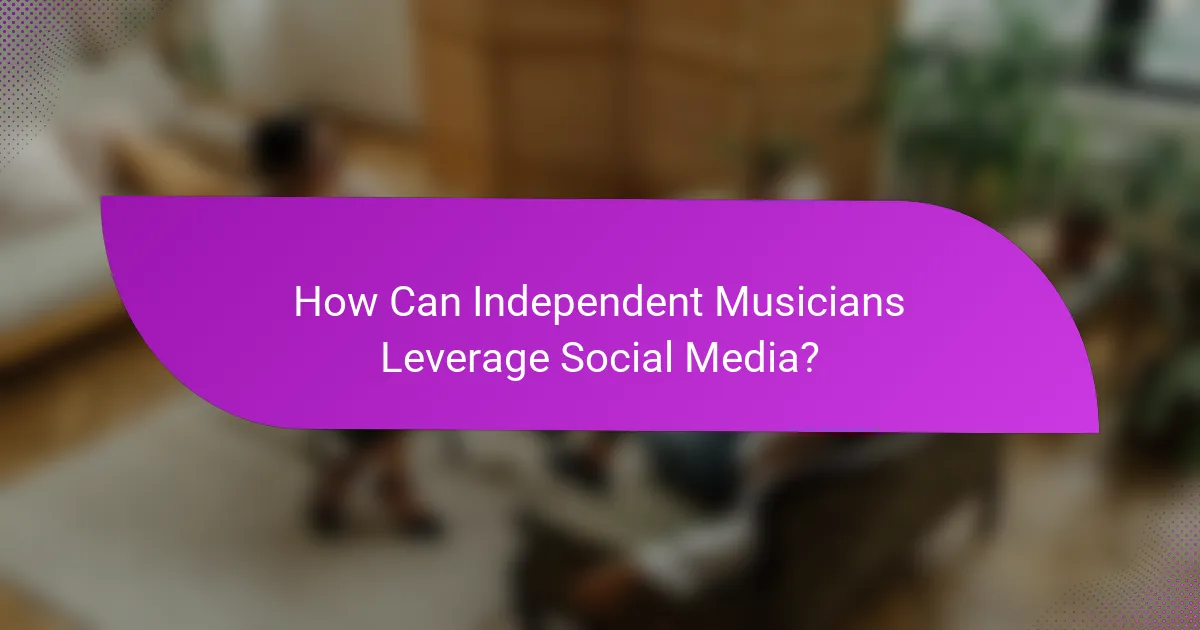
How Can Independent Musicians Leverage Social Media?
Independent musicians can effectively use social media to build their brand, connect with audiences, and promote their music. By creating engaging content and utilizing targeted advertising, artists can enhance their visibility and foster meaningful relationships within the industry.
Creating engaging content
To capture attention on social media, independent musicians should focus on creating high-quality, engaging content that resonates with their audience. This can include behind-the-scenes videos, live performances, and personal stories that showcase their journey. Consistency in posting is key; aim for a regular schedule that keeps fans engaged without overwhelming them.
Utilize various formats such as photos, videos, and stories to diversify content. Experiment with trends, challenges, or collaborations to increase reach and engagement. Engaging directly with followers through comments and messages can also enhance connection and loyalty.
Using targeted ads for promotion
Targeted ads on platforms like Facebook and Instagram can significantly boost an independent musician’s reach. These ads allow artists to specify demographics, interests, and behaviors, ensuring their music reaches potential fans who are likely to engage. Start with a modest budget and test different ad formats to see what resonates best with your audience.
Consider promoting specific events, new releases, or merchandise through these ads. Monitor performance metrics to refine your strategy, focusing on what drives the most engagement and conversions. Adjust your targeting based on insights gained from these campaigns.
Connecting with fans and industry professionals
Social media is a powerful tool for connecting with both fans and industry professionals. Engage with your audience by responding to comments, hosting Q&A sessions, or creating polls to gather feedback. Building a community around your music fosters loyalty and encourages word-of-mouth promotion.
Networking with industry professionals can be achieved through platforms like LinkedIn and Twitter. Follow and interact with producers, promoters, and other musicians to establish relationships. Attend virtual events or webinars to meet industry insiders and gain insights into the music business.
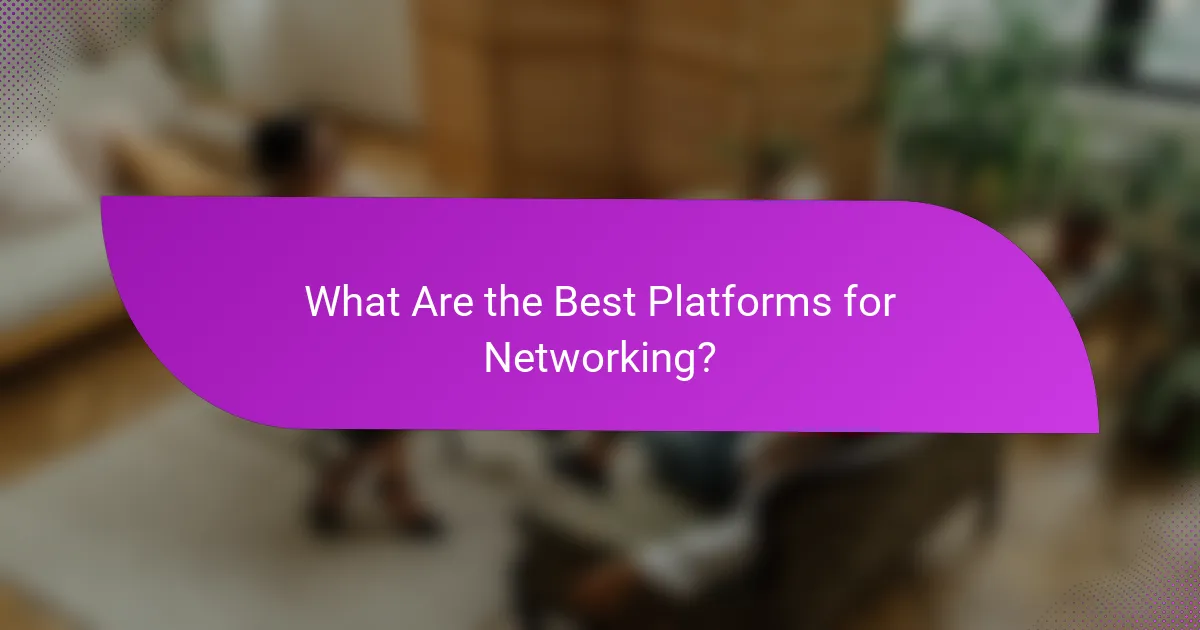
What Are the Best Platforms for Networking?
Independent musicians can benefit greatly from using various online platforms to build connections and discover opportunities. The best platforms for networking include LinkedIn, Instagram, and Facebook groups, each serving unique purposes for professional growth and community engagement.
LinkedIn for professional connections
LinkedIn is an essential platform for musicians seeking to establish professional connections within the music industry. It allows users to create a detailed profile showcasing their skills, experience, and achievements, which can attract industry professionals, collaborators, and potential employers.
To maximize your presence on LinkedIn, actively engage with industry-related content, join relevant groups, and connect with other musicians and industry professionals. Regularly updating your profile and sharing your work can enhance visibility and open doors to new opportunities.
Instagram for visual storytelling
Instagram is a powerful tool for musicians to share their artistic journey through visual storytelling. By posting photos, videos, and behind-the-scenes content, musicians can engage with their audience and showcase their personality, which helps in building a loyal fan base.
Utilize features like Stories and Reels to create dynamic content that resonates with followers. Consistency in posting and using relevant hashtags can increase your reach, making it easier to connect with other artists and industry influencers.
Facebook groups for musicians
Facebook groups provide a space for musicians to connect, share resources, and collaborate. These communities often focus on specific genres, local scenes, or aspects of the music business, making it easier to find like-minded individuals and potential collaborators.
To get the most out of Facebook groups, actively participate by sharing your experiences, asking questions, and offering support to others. Be mindful of group rules and avoid self-promotion unless it is allowed, as building genuine relationships is key to successful networking.
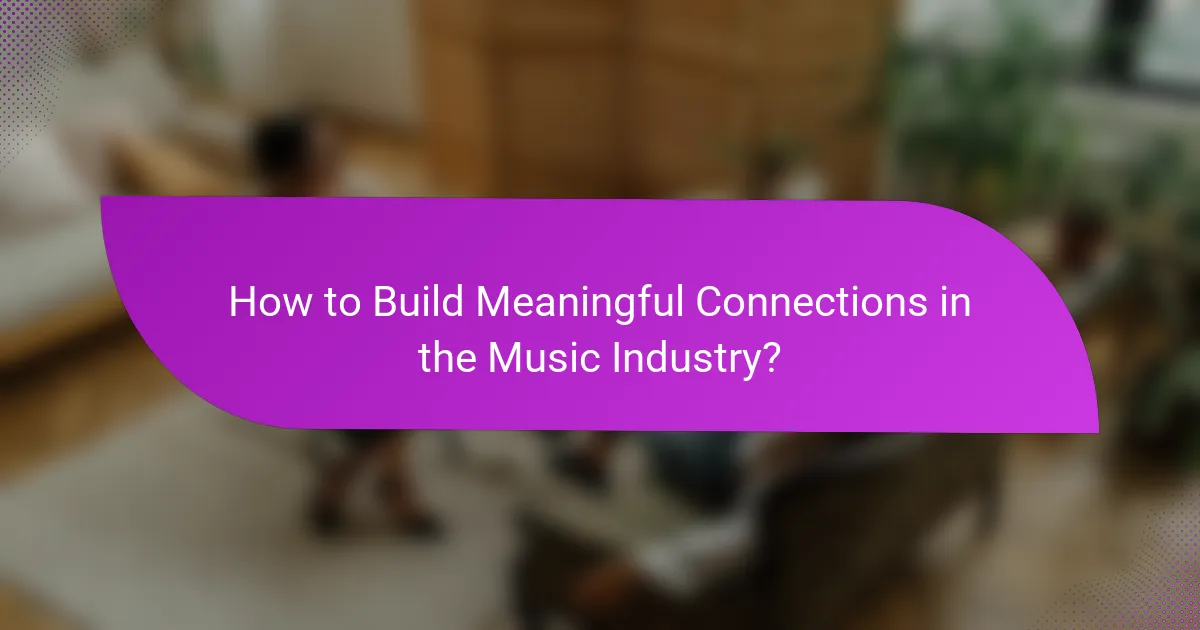
How to Build Meaningful Connections in the Music Industry?
Building meaningful connections in the music industry involves engaging authentically with others and fostering relationships that can lead to collaborative opportunities. Focus on networking through live events, social media, and industry platforms to meet fellow musicians, producers, and industry professionals.
Networking etiquette tips
Practicing good networking etiquette is essential for making a positive impression. Always introduce yourself clearly, maintain eye contact, and listen actively when others speak. Respect personal space and avoid interrupting, as this shows you value their time and input.
Dress appropriately for the occasion, whether it’s a casual gig or a formal industry event. Tailor your approach based on the setting and the individuals you are meeting. A friendly demeanor and a genuine smile can go a long way in establishing rapport.
Following up after initial meetings
Following up after initial meetings is crucial for solidifying connections. Send a brief thank-you message within a few days, expressing your appreciation for their time and mentioning something specific from your conversation. This personal touch helps reinforce the connection.
Consider connecting on social media platforms like LinkedIn or Instagram, where you can engage with their content and stay updated on their work. Regular, thoughtful interactions can keep you on their radar and open doors for future collaborations.
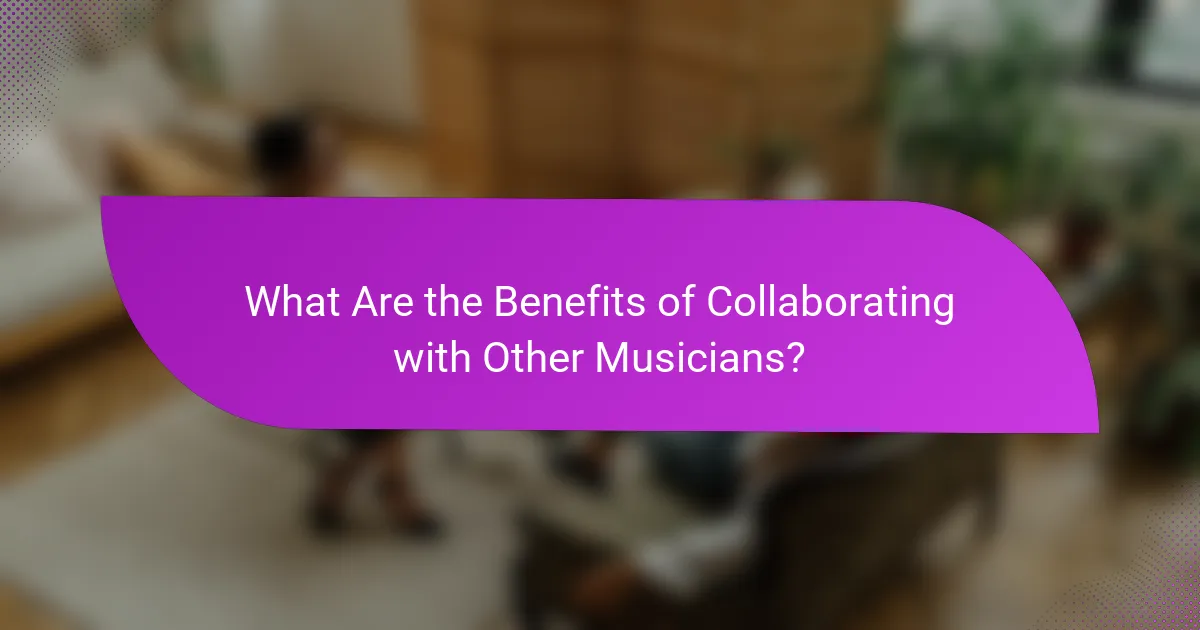
What Are the Benefits of Collaborating with Other Musicians?
Collaborating with other musicians offers numerous advantages, including increased exposure and access to new creative ideas. By working together, artists can leverage each other’s strengths, leading to enhanced musical projects and broader audience engagement.
Expanding audience reach
Collaborating with fellow musicians can significantly expand your audience reach. When you partner with another artist, you tap into their fan base, which can introduce your music to listeners who may not have discovered you otherwise.
Consider featuring on each other’s tracks or performing together at live events. This not only diversifies your music but also creates a shared promotional opportunity, allowing both artists to benefit from increased visibility.
To maximize this benefit, choose collaborators whose style complements yours and whose audience aligns with your target demographic. This strategic approach can enhance the effectiveness of your outreach efforts and foster a more engaged listener community.
